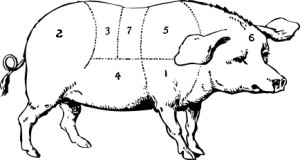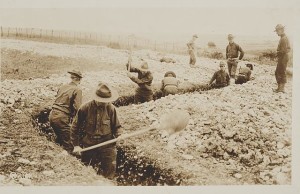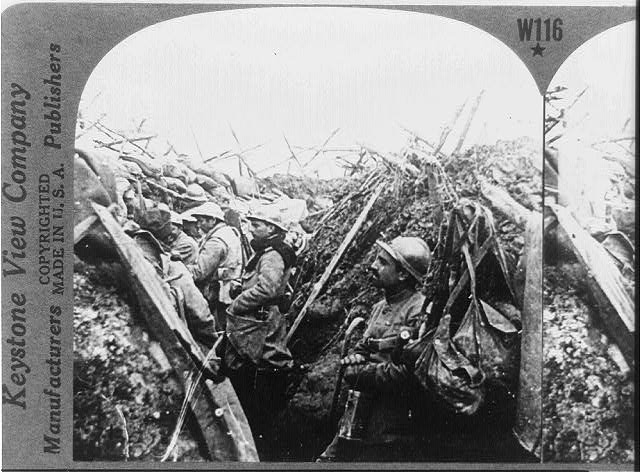From the Richmond Daily Dispatch November 10, 1863:
Eat Press [Less] meat.
–The great scarcity of meats of all kinds in this Confederacy renders it absolutely necessary that all classes should be exceedingly economical in its use, in order to furnish the Southern armies with proper rations. In the old countries, where the people possess iron constitutions and enjoy fine health, comparatively little meat is used. We must follow their example during this war. Every housekeeper should raise as many hogs and beeves as possible, and every farmer ought to devote a fair proportion of his best lands to the cultivation of the Chinese sugar cane, from which to make abundant supplies of molasses. By doing this, and by cultivating and drying fruits of all sorts, we shall have an abundance of good, nourishing food for private families and exempts and a fair promotion of meats for, the army. The South has its all in this war. It must conquer an honorable peace, or lose all that is worth living for. If it desires freedom its people must be willing to bear sacrifices, privations, and want. Without these we cannot succeed, and the sooner every man and woman in the land makes up their mind to bear all and suffer all, rather than become Northern slaves, the sooner we will attain to the great end for which we are aiming. Meat is scarce, very scarce, and we are compelled to do with very little of it, even now. The stock on hand can last but a short time, and our readers should make up their minds to do without it altogether till this horrid war is over.
A market report earlier in the week included a paragraph on meat prices, domesticated and wild. From the Richmond Daily Dispatch November 6, 1863:
… In the City Markets there has been a slight advance in nearly all the articles offered for sale. Fresh Meats are worth from $1.25 to $1.50 for beef and mutton, and $2 for pork; Chickens $6 to $8 per pair; Turkeys $12 to $15 a piece; Ducks $7 to $8 per pair; Raccoon $10 apiece; Opossum from $2.50 to $5, according to size; Rabbits $1.50 to $2; Squirrels $1; Fish — small Alewives $2 per bunch of four; Catfish $1.50 to $2 per bunch of four; Butter $5 per pound; Sweet Potatoes $2.50 per half peck; Irish Potatoes, $2 per half peck; Turnips $2 per peck; Cabbage 75 cents to $1.25 per head. …
From the Richmond Daily Dispatch November 11, 1863:
Local Matters. …
One thousand dollars reward
is offered by the Mayor, under an order of the City Council, for the arrest and conviction of the person or persons engaged in seizing hogs and other articles from citizens, under the pretext of being Confederate impressing officers. A similar reward would be very appropriate for the man that induced persons to sell their hogs to him, by representing that the Government intended to seize them. This species of swindle was practiced on white and black, and the author is liable to a term in the penitentiary, if convicted. …
Flour
continues scarce, and commands enormous prices. We have heard of some few lots selling as high as $110. A mercantile firm on 12th street received a lot on Monday last, and was offered $100 per barrel for it by a baker, but refused to sell to him at any price, preferring to sell it to families at $80 per barrel, which they did in a very short time. If farmers could be induced to thresh out their grain the supply would soon equal the demand, but they will not do so.
Salt Meats.
–The City Council have passed a resolution allowing the renters of stalls in the meat markets to sell bacon and lard. An effort was made to add butter to the list, but the Council refused to do so, one or more members alleging [ that that ] would open the door for huckstering, and that neither grocers nor families would ever be able to get a supply save from the swarm of cormorants who bought up all that came to the city and retailed it out at their own prices. …
Increase of salaries.
–The City Council have amended an ordinance increasing the salaries of the police twenty five per cent.–This increase will help the officers to buy bread, but is not enough to enable them to educate their children.
And it sure would be a good idea to keep the police force happy. From the same article:
Popular move.
–The amended ordinance reported to the Council by Mr. Hill, at its last meeting, by which negroes are prevented from riding in hacks about the streets, will be the most popular law that the Council have enacted for many years. Negroes should be treated humanely, but should be kept in their places. For months past they have monopolized the public hacks, by day and night, and many slaves have no doubt been enabled to escape from their masters by the use of such vehicles.
It seems that wages for Richmond police officers were similar to other wages in the South: “Wage increases lagged far behind price increases. In 1862 wages for skilled and unskilled workers increased about 55 percent while prices rose 300 percent.”[1]
___________________________________________
___________________________________________
__________________________________________________
The image of hog butcher diagram is from wpclipart
- [1]McPherson, James M. The Battle Cry of Freedom: The Civil War Era. New York: Ballantine Books, 1989. Print. page 440.↩

![[Gettysburg, Pa. Confederate dead gathered for burial at the edge of the Rose woods, July 5, 1863] (by Alexander gardner, 1863 July [5]; LOC: LC-DIG-cwpb-00882)](https://www.bluegrayreview.com/wp-content/uploads/2013/11/00882r-300x289.jpg)


![[German military personnal in a trench] (between 1914 and 1918; LOC: LC-USZ62-136101)](https://www.bluegrayreview.com/wp-content/uploads/2013/11/3c36101r-300x244.jpg)
